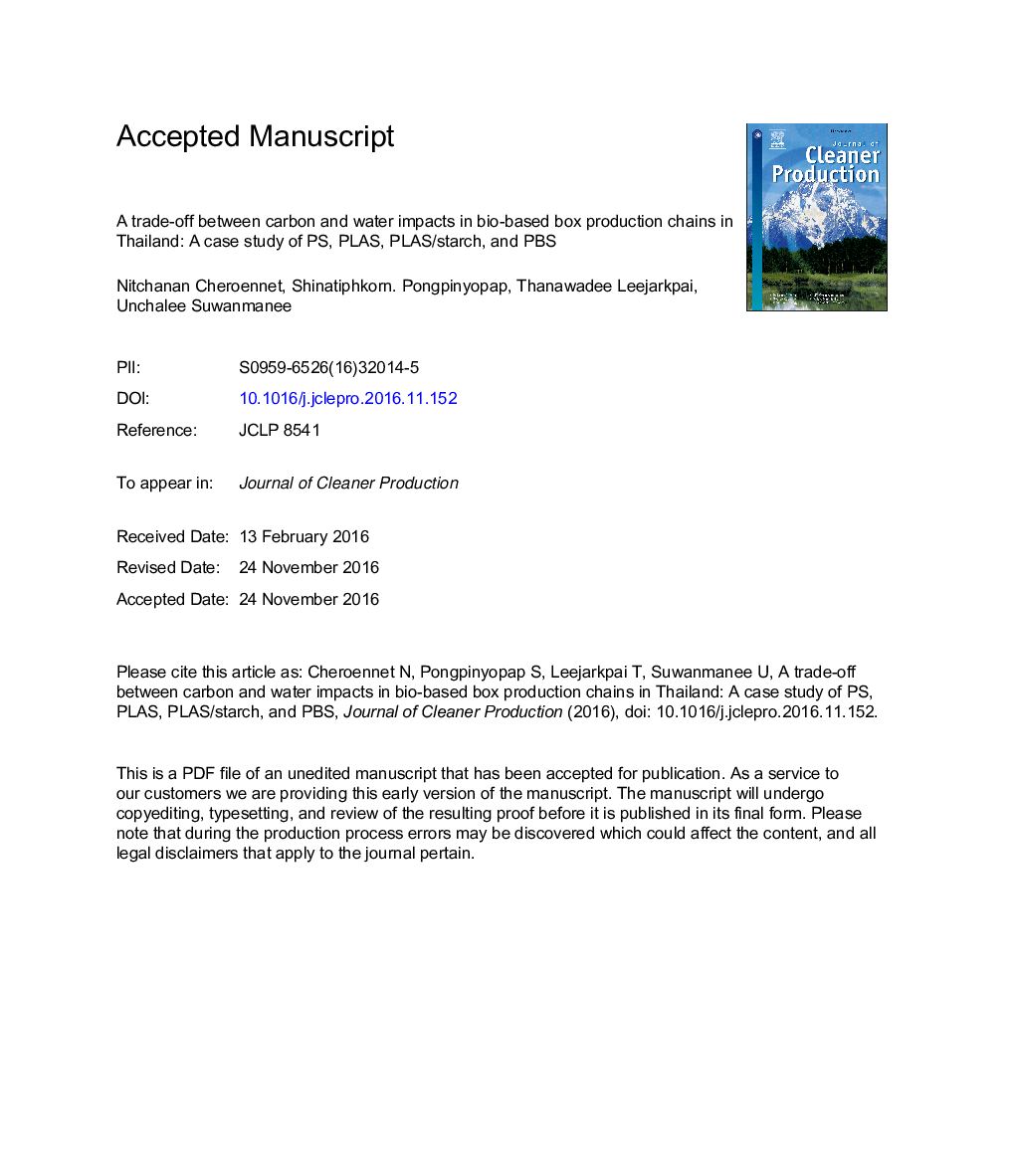| کد مقاله | کد نشریه | سال انتشار | مقاله انگلیسی | نسخه تمام متن |
|---|---|---|---|---|
| 5479509 | 1522087 | 2017 | 40 صفحه PDF | دانلود رایگان |
عنوان انگلیسی مقاله ISI
A trade-off between carbon and water impacts in bio-based box production chains in Thailand: A case study of PS, PLAS, PLAS/starch, and PBS
دانلود مقاله + سفارش ترجمه
دانلود مقاله ISI انگلیسی
رایگان برای ایرانیان
کلمات کلیدی
موضوعات مرتبط
مهندسی و علوم پایه
مهندسی انرژی
انرژی های تجدید پذیر، توسعه پایدار و محیط زیست
پیش نمایش صفحه اول مقاله

چکیده انگلیسی
Currently, bio-based plastics are considered the most promising and environmentally friendly alternative to replace petroleum-based plastics to reduce their environmental impacts. The aim of this research work is to assess and compare the life cycle impact of three types of bio-based boxes (namely, polylactic acid from sugarcane, polylactic acid from sugarcane-starch blends and polybutylene succinate from sugarcane and corn) and petroleum-based boxes of polystyrene. The locations of the plantation stage are focused in 4 provinces, namely, Kanchanaburi, Sakaeo, Prachinburi, and Chonburi provinces, in Thailand. The total impact using the external environmental cost (unit: THB equivalent) is performed at two impact categories: carbon footprint and fresh water consumption. The results from this study indicate that polybutylene succinate reveals the lowest water footprint at 0.38 m3 H2O of all the bio-based boxes and presents the second lowest water deprivation at 0.008 m3 H2O equivalent and the lowest carbon footprint at â0.06 kg CO2 equivalent. The lowest water footprints for all bio-based boxes production chains are found in Kanchanaburi and Chonburi provinces because the highest sugarcane and corn yield were observed, respectively, whereas, the minimum of water deprivation for all bio-based boxes production chains are clearly observed in Sakaeo province because of the lowest amount of chemicals used during plantation stage. The total impact on carbon footprint decreased by 26-69% for the production of bio-based boxes because CO2 absorption from the photosynthetic reactions during the plantation stages were included. In conclusion, for bio-based boxes, the polybutylene succinate box showed the lowest total externality cost of 0.046 THB equivalent on production chain in Sakaeo province. This externality accounts for 64-74% of total cost for freshwater consumption but only accounts for 26-36% of total cost for carbon footprint. These results are beneficial to supporting the development for establishing bio-plastics industry in aspects of water used and carbon footprint. Therefore, the effective strategies for preparing a sufficient supply of irrigation system or efficient water management and appropriate performance from agrochemicals used for supporting the feedstocks production to bio-plastics industry production chains should be proposed.
ناشر
Database: Elsevier - ScienceDirect (ساینس دایرکت)
Journal: Journal of Cleaner Production - Volume 167, 20 November 2017, Pages 987-1001
Journal: Journal of Cleaner Production - Volume 167, 20 November 2017, Pages 987-1001
نویسندگان
Nitchanan Cheroennet, Shinatiphkorn. Pongpinyopap, Thanawadee Leejarkpai, Unchalee Suwanmanee,